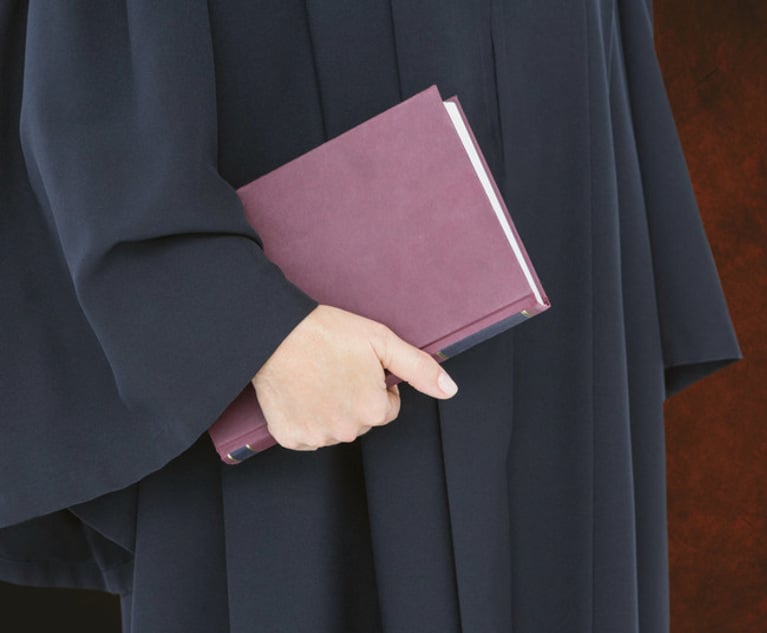 (Photo: Mike Stewart/AP)
(Photo: Mike Stewart/AP)Sumter County Judge Rules Against Activists in Ballot Secrecy Suit
Activists said Georgia's new voting machines' large, bright, vertical touchscreens and large font allow other people in the room to see a voter's selections.
March 02, 2020 at 01:58 PM
4 minute read
A judge has declined to order election officials in a Georgia county to use hand-marked paper ballots after election integrity activists raised concerns that the state's new voting machines violate voters' right to a secret ballot.
In a lawsuit filed last week in Sumter County Superior Court against the five members of the county election board, the activists said the machines' large, bright, vertical touchscreens and large font allow other people in the room to see a voter's selections.
In denying an emergency motion seeking a switch to hand-marked paper ballots, Sumter County Superior Court Judge Rucker Smith wrote in an order signed Monday that the activists hadn't proven that it will "impossible or impracticable" for the election officials to arrange the voting machines "in a manner that protects the secrecy of the ballot while allowing sufficient monitoring."
The judge wrote that it is not his responsibility to determine how the machines should be configured, but that it is the responsibility of the election officials to comply with Georgia law.
Georgia lawmakers last year passed a law providing for a new voting system and Secretary of State Brad Raffensperger in July awarded a contract to Dominion Voting Systems.
The new system replaces the outdated paperless touchscreen machines and election management system the state had been using since 2002. The new touchscreen voting machines are connected to printers that produce a paper ballot that voters feed into a scanner that reads and tallies the votes.
Officials with the secretary of state's office, which oversees elections, have acknowledged that there are legitimate privacy concerns with the new machines. They recently sent precinct layout diagrams to county election officials to illustrate how machines could be arranged to help with those concerns.
The lawsuit says those layouts don't work because they don't completely protect a voter's selections from the view of other voters and don't allow poll workers to see the machines to prevent tampering as required by law.
The lawsuit was filed by the Coalition for Good Governance, an election integrity group, and three individual Georgia voters who are members of the group.
Coalition executive director Marilyn Marks said Monday that she was in Sumter County looking to see whether election officials were able to meet with all the requirements of the law as early voting opened for the presidential primary.
"They had assured the judge that the election board of Sumter County would be able to protect the absolute secrecy of the ballot, and we do not believe that they can," Marks said in a phone interview.
To comply with both ballot secrecy and anti-tampering requirements, Marks said, machines would have to be placed far apart with the voter's back to the wall. Many polling places don't have enough space to accommodate a sufficient number of machines arranged that way, she said.
The lawsuit said a clear violation of the voters' constitutional right to a secret ballot could cause an election to be declared null and void.
Copyright 2020 AP. All rights reserved. This material may not be published, broadcast, rewritten, or redistributed.
This content has been archived. It is available through our partners, LexisNexis® and Bloomberg Law.
To view this content, please continue to their sites.
Not a Lexis Subscriber?
Subscribe Now
Not a Bloomberg Law Subscriber?
Subscribe Now
NOT FOR REPRINT
© 2025 ALM Global, LLC, All Rights Reserved. Request academic re-use from www.copyright.com. All other uses, submit a request to [email protected]. For more information visit Asset & Logo Licensing.
You Might Like
View All
Why Georgia's Latest Push to Curb Lawsuits Has Business Groups and Trial Lawyers at Odds
6 minute read
Justice Department Enters Consent Decree With Fulton County Over Jail Conditions
6 minute read

Georgia Supreme Court Honoring Troutman Pepper Partner, Former Chief Justice
2 minute readTrending Stories
- 1Courts, Lawyers Press On With Business as SoCal Wildfires Rage
- 2Florida, a Political Epicenter, Is the Site of Brownstein Hyatt's 13th Office
- 3Law Firms Close Southern California Offices Amid Devastating Wildfires
- 4Lawsuit alleges racial and gender discrimination led to an Air Force contractor's death at California airfield
- 5Holland & Knight Picks Up 8 Private Wealth Lawyers in Los Angeles
Who Got The Work
Michael G. Bongiorno, Andrew Scott Dulberg and Elizabeth E. Driscoll from Wilmer Cutler Pickering Hale and Dorr have stepped in to represent Symbotic Inc., an A.I.-enabled technology platform that focuses on increasing supply chain efficiency, and other defendants in a pending shareholder derivative lawsuit. The case, filed Oct. 2 in Massachusetts District Court by the Brown Law Firm on behalf of Stephen Austen, accuses certain officers and directors of misleading investors in regard to Symbotic's potential for margin growth by failing to disclose that the company was not equipped to timely deploy its systems or manage expenses through project delays. The case, assigned to U.S. District Judge Nathaniel M. Gorton, is 1:24-cv-12522, Austen v. Cohen et al.
Who Got The Work
Edmund Polubinski and Marie Killmond of Davis Polk & Wardwell have entered appearances for data platform software development company MongoDB and other defendants in a pending shareholder derivative lawsuit. The action, filed Oct. 7 in New York Southern District Court by the Brown Law Firm, accuses the company's directors and/or officers of falsely expressing confidence in the company’s restructuring of its sales incentive plan and downplaying the severity of decreases in its upfront commitments. The case is 1:24-cv-07594, Roy v. Ittycheria et al.
Who Got The Work
Amy O. Bruchs and Kurt F. Ellison of Michael Best & Friedrich have entered appearances for Epic Systems Corp. in a pending employment discrimination lawsuit. The suit was filed Sept. 7 in Wisconsin Western District Court by Levine Eisberner LLC and Siri & Glimstad on behalf of a project manager who claims that he was wrongfully terminated after applying for a religious exemption to the defendant's COVID-19 vaccine mandate. The case, assigned to U.S. Magistrate Judge Anita Marie Boor, is 3:24-cv-00630, Secker, Nathan v. Epic Systems Corporation.
Who Got The Work
David X. Sullivan, Thomas J. Finn and Gregory A. Hall from McCarter & English have entered appearances for Sunrun Installation Services in a pending civil rights lawsuit. The complaint was filed Sept. 4 in Connecticut District Court by attorney Robert M. Berke on behalf of former employee George Edward Steins, who was arrested and charged with employing an unregistered home improvement salesperson. The complaint alleges that had Sunrun informed the Connecticut Department of Consumer Protection that the plaintiff's employment had ended in 2017 and that he no longer held Sunrun's home improvement contractor license, he would not have been hit with charges, which were dismissed in May 2024. The case, assigned to U.S. District Judge Jeffrey A. Meyer, is 3:24-cv-01423, Steins v. Sunrun, Inc. et al.
Who Got The Work
Greenberg Traurig shareholder Joshua L. Raskin has entered an appearance for boohoo.com UK Ltd. in a pending patent infringement lawsuit. The suit, filed Sept. 3 in Texas Eastern District Court by Rozier Hardt McDonough on behalf of Alto Dynamics, asserts five patents related to an online shopping platform. The case, assigned to U.S. District Judge Rodney Gilstrap, is 2:24-cv-00719, Alto Dynamics, LLC v. boohoo.com UK Limited.
Featured Firms
Law Offices of Gary Martin Hays & Associates, P.C.
(470) 294-1674
Law Offices of Mark E. Salomone
(857) 444-6468
Smith & Hassler
(713) 739-1250






